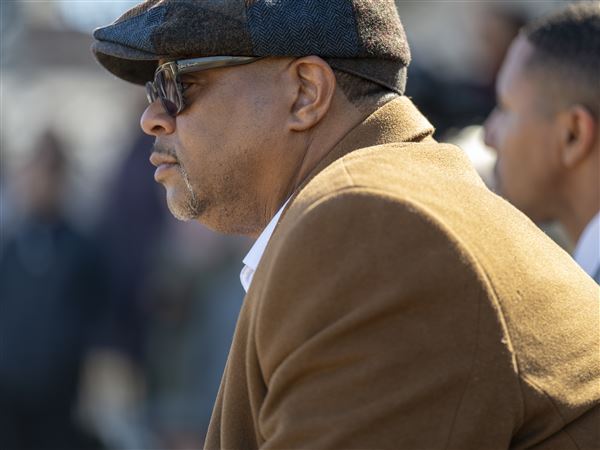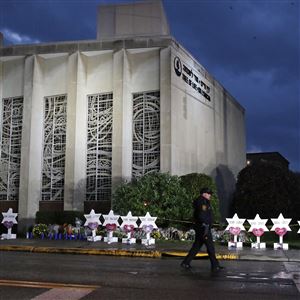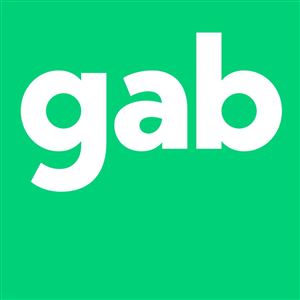The social networking site on which Robert Bowers expressed hatred for Jews and immigrants in the weeks prior to Saturday’s Squirrel Hill shootings is reeling but defiant this weekend, according to posts by its CEO.
Mr. Bowers, 46, of Baldwin Borough, is charged with federal and state crimes in the slayings Saturday of 11 people at the Tree of Life Synagogue.
Saturday morning, someone who appears to be Mr. Bowers posted on Gab.com: “HIAS likes to bring invaders in that kill our people. I can’t sit by and watch my people get slaughtered. Screw your optics, I’m going in.”
HIAS, formerly the Hebrew Immigration Aid Society, helps refugees to find housing and other life needs after the federal government admits them to the U.S.
In the past week, Mr. Bowers posted repeatedly on Gab.com. Among the posts: “Daily Reminder: Diversity means chasing down the last white person.” Another: “welp, it’s 8 bells and time to raid the kike group.” Yet another: “The Mass Migration Agenda [link to a YouTube video] diversity for you but not for jew."
According to the federal criminal complaint against Mr. Bowers, he entered the Tree of Life Synagogue with three Glock .357 handguns and a Colt AR-15 model SP1. Upon arrest, according to the complaint, “Bowers commented to one law enforcement officer, in substance, ‘They’re committing genocide to my people. I just want to kill Jews.’”
On Sunday, Andrew Torba, the CEO of Gab.com, posted that the server provider had shut the site down, but that the company found another provider.
"GAB IS NOT GOING ANYWHERE,” Mr. Torba posted. “I don’t care what we have to do, I don’t care what it takes. We will build everything from the ground up if we have to. We may be down for a few weeks. ... Keep fighting for freedom. We sure will be. Please pray for the victims and their families. I know many of you are upset at what is happening to Gab, but the focus should be on them.”
Extremism is “no longer that you’re in a basement meeting and everyone has a membership card and everybody knows who the leaders are,” said Keegan Hankes, a senior research analyst with the Southern Poverty Law Center, which tracks the activities of extremists.
Gab.com hosts “leaders of this movement who identify as such, and their followers know to find them there,” Mr. Hankes said. “This is one of the only places these people can go, and say whatever they want, no matter how despicable.”
And while the leaders can be monitored, his center had not stumbled upon Mr. Bowers prior to Saturday.
“Increasingly,” he said, “we don’t know these people before something terrible happens.”
Mr. Torba describes himself on his site as: “Patriot. CEO of @gab. I’m fighting for a better internet that puts people first and promotes free speech for all.”
Three months ago, he posted: “Free speech means you can offend, criticize, and make memes about any race, religion, ethnicity, or sexual orientation. Sick and tired of the double standards for ‘acceptable speech’ and ‘protected classes’ on both the left and the right. Free speech for ALL about ALL.”
Saturday night, in the wake of news of Mr. Bowers’ posts on Gab.com, Mr. Torba posted: “We have probably the most traffic we have ever had. ... Gab is doubling down on free speech and individual liberty.”
As Gab.com dealt with the traffic and server issues, though, his tone turned panicked.
“Please pray for us. Our families, our friends, and our community are all under attack,” he posted. “God is on our side. Never forget that. God is on Gab. Pray.”
Gab was banned from using or referencing PayPal and was ditched by payment processing firm Stripe, according to the posts. Joyent, a subsidiary of Samsung that had some relationship with Gab.com, canceled that relationship Saturday, according to postings on Gab.com.
A PayPal spokesman confirmed that the internet payment giant was no longer doing business with Gab.com.
“PayPal has been closely monitoring Gab and was in the process of canceling the site’s account before the tragic events occurred,” spokesman Justin Higgs wrote in response to questions. “The company is diligent in performing reviews and taking account actions. When a site is allowing the perpetuation of hate, violence or discriminatory intolerance, we take immediate and decisive action.”
Joyent and Stripe did not immediately respond to requests for comment. Nor did Gab’s legal team or Mr. Torba.
Sunday morning, Mr. Torba appeared to be appealing to President Donald Trump for some support.
“Where is President Trump at?” Mr. Torba posted. “I voted for President Trump. I helped get him elected. ... Can we get one tweet defending Gab.com, our work with law enforcement to bring a terrorist to justice, and our defense of free speech online for all people? Is that too much to ask?”
Sites like Twitter and Facebook have curbed extremist speech on their platforms. Others, like 4chan, feature anonymous posts, and Reddit has havens for people all over the political spectrum.
“Mainstream fringe sites like 4chan and parts of Reddit get most of the attention, and sites like Gab fly under the radar outside of these communities because frankly they’re these isolated islands that don’t connect to the reality-based internet,” said Brandon Szuminsky, an assistant professor at Baldwin Wallace University who teaches media literacy and has published research on misinformation and social media.
Technology has fragmented the media landscape so that it’s virtually impossible to get the kind of broad audience that news outlets coveted in times past, he said. Social media’s business model relies not on breadth, but on intensity of engagement.
“Even if the site owners don’t want to perpetuate hate like Gab did, they're willing to look the other way to make money,” he said.
Gab champions free speech, which most people support, Mr. Szuminsky said. But social media sites aren’t subject to the First Amendment’s bar on governmental suppression of speech.
“They very much have the ability to censor content,” he said. “The question is whether they do it.”
When they don’t? Then viewpoints that would have been “tempered” by face-to-face social norms can find “a community that they can’t get elsewhere. ... Online, it amplifies and reinforces and leads to things like [Saturday’s shootings].”
Gab.com’s history, its David-and-Goliath self-image, and its struggles with big tech are outlined in a lawsuit it filed in September 2017, in which it alleged that Google was using monopoly power to crush a small competitor.
The complaint, filed by Gab.com’s predecessor company, Gab. AI Inc., in federal court in Philadelphia, indicated that the tiny social media firm was based at 1900 Market St., a freshly renovated office building in that city.
According to the lawsuit, Gab was launched in August 2016 by Mr. Torba and Ekrem Buyukkaya, a Turkish resident, in response to Twitter’s alleged policy of “banning outspoken conservatives” or “compromising” their communications. Mr. Torba, according to the lawsuit, was a “fervent” supporter of President Trump, while Mr. Buyukkaya “expressed his disdain” for the Republican.
The lawsuit claimed an innovative concept — allowing posts like Twitter’s, and up-or-down votes like Reddit — plus big plans. The little company was working on GabTV and preparing to deploy “increasingly more sophisticated use of artificial intelligence” including “chatbots” and “not safe for work” warnings on some content. It was gearing up for an “initial coin offering” — the cryptocurrency version of a stock offering.
Gab’s rules, according to the lawsuit, prohibited several forms of speech, including “communications calling for acts of violence” and “the use of threatening language.” But Gab was different from established social media sites, according to the complaint, because the others “have made the elimination of ‘hate speech’ within their realms a publicly-prominent priority” while Gab believes that “hate speech” is just “a particular point of view.”
Gab’s lawyers wrote that it was never permitted to include its app in the Apple App Store, ultimately because of “defamatory or mean-spirited” comments on the site that “targeted groups.” Gab’s app became available on Google’s Android Play Store in May 2017, though, and sales of paid “Gab Pro membership” surged. However, three months later, Google removed Gab’s app “because it violates the hate speech policy,” according to the lawsuit.
The lawsuit sought monetary damages, plus a preliminary injunction forcing Google to end its “monopolizing behavior.” But Gab withdrew the lawsuit the month after it was filed, providing no explanation.
According to the right-wing news site Breitbart.com’s reporting in September, based on an interview with Mr. Torba, Gab.com “rebranded” and aimed “to provide an infrastructure for tech developers that wish to grow their own platforms and products without being forced to go through leftist companies based in Silicon Valley.”
At the time, Mr. Torba boasted that Gab.com had 670,000 users and was adding 100,000 a month, including many from Brazil, India and Sweden, where, he said, people faced “a recent wave of censorship aimed at major influencers on the right.” He also announced a fundraising campaign in which users could “invest in the company, own stock, and join us on our journey to build the home of free speech online,” claiming that it raised $280,000 in the first 24 hours.
Many of Gab.com’s most popular posts Sunday were defiant.
A lengthy “Gabonian alert” suggested that the shooting was being used as a pretext for eliminating the site shortly before the Nov. 6 midterm elections, and called on users to keep up with Gab.com’s efforts through Breitbart.com, Gateway Pundit or the online agitator Alex Jones. A user suggested that fans of the site “flood the White House with emails.” Another blamed “culprit other than Robert Bowery [sic]” and included the hashtag #BanHIAS.
Mid-morning, though, Mr. Buyukkaya announced his resignation from Gab, via a post on the site claiming that “attacks from the American press ... have taken a toll on me personally.” The site was only intermittently functioning by mid-afternoon.
If Gab survives, will it change?
“The whole point of Gab is to allow that kind of speech. That’s the market they've staked out,” said Graham Brookie, director and managing editor of the Digital Forensic Research Lab at the Atlantic Council, which specializes in debunking disinformation. “There’s clearly a market for hate speech, which pains me to say.”
And if it doesn’t survive?
“The sad thing is there will probably be another Gab tomorrow if it doesn’t survive the publicity of this,” Mr. Szuminsky said. “There's always another rat hole.”
Rich Lord: rlord@post-gazette.com or 412-263-1542. Twitter @richelord. Ashley Murray: 412-263-1750, amurray@post-gazette.com.
First Published: October 28, 2018, 2:39 p.m.
































